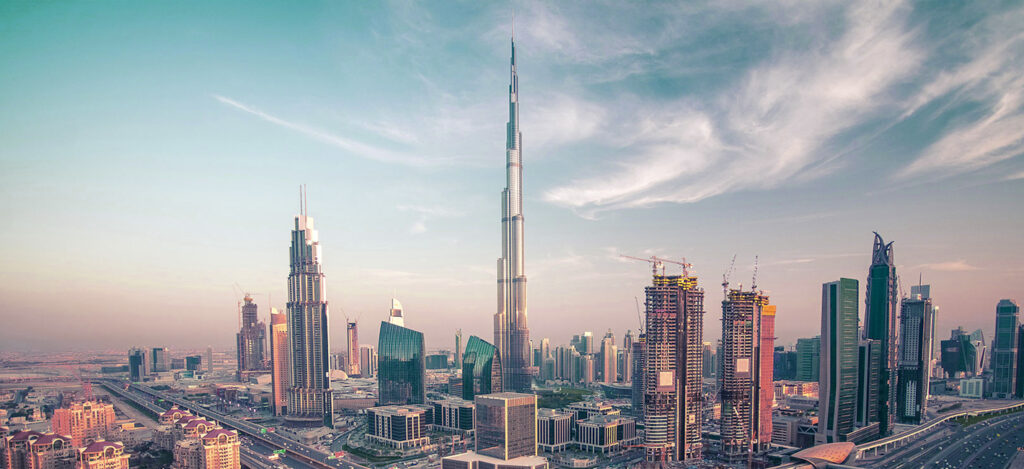
Doing business in the UAE
There are a number of factors that make the UAE a high growth market. Among these are its business-friendly environment, strategic location as a global trading hub, world-class infrastructure, and favourable government policies in promoting trade and investment. Having maintained resilience during the Covid-19 pandemic, the country is well positioned to capture a return to prepandemic growth levels across sectors, thereby opening up new opportunities for companies doing business.
Trade and economic overview
Despite being one of the Middle East’s most diversified economies, the United Arab Emirates (UAE) suffered from the effects of the Covid-19 crisis, both in terms of low oil prices and reduced global demand, and the impact of global lockdown measures on vital non-oil economic sectors such as tourism. According to Central Bank estimates for 2020, total GDP contracted by 5.8%, with nonhydrocarbon GDP declining by 5.7%.
Nevertheless, the latest data suggests that the economy is on the path to revival. In early April 2021, the International Monetary Fund (IMF) revised the Gulf state’s overall economic growth forecast for the year to 3.1%, from 1.3% in October 2020, citing as reasons for the adjustment the recent improvements in the oil sector, Expo 2020 – which kicks off in October – and the UAE’s positive and proactive handling of the coronavirus as one of the “league of early inoculators worldwide”.
“We have started to see a stabilisation and an uptick in trade flows over the last few months,” says Yusuf Ali Khan, Trade Head for Middle East, North Africa and Pakistan, Treasury and Trade Solutions at Citi. “According to the Dubai Chamber of Commerce and Industry, the UAE’s non-oil trade is expected to post almost 13% growth in 2021. We’re likely to see a pick-up in the hospitality, tourism and leisure industry, especially as we head into Expo 2020, which was delayed from last year due to the pandemic. This event will act as a catalyst in terms of promoting trade and investment opportunities for companies across sectors.”
A number of pandemic support measures have been introduced by the UAE government, both at the Federal and Emirate level. In early 2020, it was announced that financial stimulus worth some US$70bn would be rolled out by the government to reduce the cost of doing business in the country, supporting small businesses, and accelerating the implementation of major government infrastructure projects.
At the same time, the UAE Central Bank introduced the ‘Targeted Economic Support Scheme’ – since extended until June this year – which provides temporary relief from the payments of principal and/or interest on outstanding loans for all affected private sector corporates, SMEs and individuals. The scheme aims to relieve existing capital buffers to facilitate the lending capacity of banks operating in the country.
More recently, and an important contributing factor to its future growth, the UAE has been widely praised for its response to the virus, which initially saw the implementation of strict lockdown measures, before a gradual reopening and the roll out of one of the world’s fastest vaccination programmes.
“All of these influences – the government policies and stimulus packages, the expectations around Expo 2020, the rising oil prices and the vaccine success – combined with the opening up of global trade and travel, are acting as enablers to create stability, re-establish demand and drive growth,” says Khan.
Geopolitical relations
The historic peace agreement signed between the UAE and Israel in August last year is also expected to unlock trade and investment opportunities.
“This is another key enabler, which is going to be a game-changer for both countries, as opportunities that have been missed for so many decades can now finally be captured,” says Khan. “International banks that have a significant presence in both countries, such as Citi, have a key role to play, but this does not preclude local banks from both countries who have sought licenses to start operations.”
As reported by credit insurance provider Atradius in recent economic research, according to various sources, including officials from both countries, the agreement could drive annual bilateral trade between the two nations in the medium term to anywhere between US$4bn and US$6.5bn, equivalent to about 1% to 1.5% of each nation’s GDP.
“UAE companies can satisfy Israeli demand for aluminium, ceramics and other construction materials, while Israeli companies can help the UAE advance in the high-tech field,” the report notes.
There are also synergies in terms of market access, says Khan. “As an historical trading hub, the UAE can be Israel’s gateway to trade corridors from the East, and even Africa.”